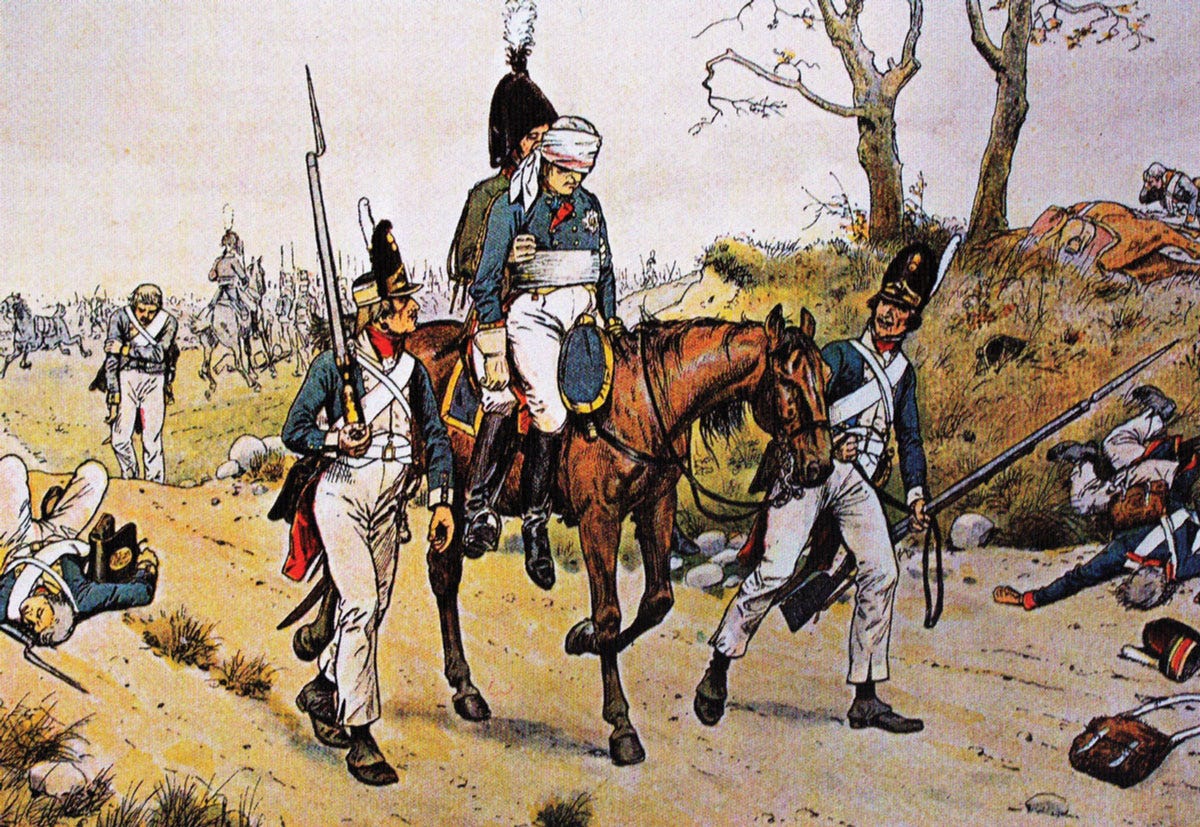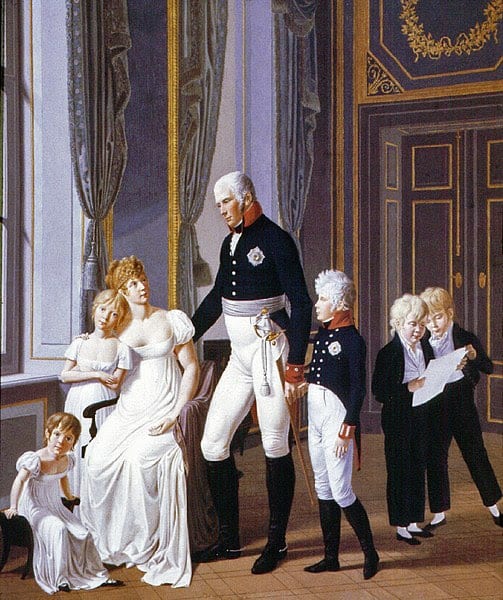America as Prussia in 1806
Decaying Institutions, Social Nihilism, Elite Complicity, and a Slow March Toward Disaster

A vain, immoderate faith in these institutions made it possible to overlook the fact that their vitality was gone. The machine could still be heard clattering along, so no one asked if it was still doing its job.1 - Carl von Clausewitz on Prussia in 1806
In the autumn of 1806, the Kingdom of Prussia, “The Iron Kingdom,” suffered one of the most rapid and humiliating military defeats in modern European history.2 The twin battles of Jena and Auerstedt shattered not only its army but the myth of invincibility that had surrounded the legacy of Frederick the Great. For the young Carl von Clausewitz, then a junior officer in the collapsing Prussian forces, this moment marked a personal and national catastrophe that would shape his life’s work. Clausewitz would come to see the defeat not simply as a failure of generalship or tactics, but as the exposure of a more profound institutional and societal crisis; one in which a state had grown complacent, a military rendered obsolete, and a society stripped of civic vitality falling apart during “the most decisive conflict in which they would ever have to fight.”3 In that collapse and Clausewitz’s later reflections, one finds an unsettling parallel to present-day America, a powerful nation outwardly strong, yet increasingly vulnerable to the same internal rot.
Prussia’s disaster in 1806 was the formative experience for the author of On War. How the armies of Frederick the Great and the state that he painstakingly built collapsed like a house of cards was a question that bothered Clausewitz for many years.4 It was a comprehensive disintegration of a system that had, since the mid-eighteenth century, claimed a position of prominence in European military affairs based on its discipline, linear tactics, and centralized command. Yet by the turn of the nineteenth century, these very strengths had calcified into weaknesses. Clausewitz foresaw disaster. Even as a young lieutenant, he was already warning of the Prussian army’s growing detachment from reality. In his early writings, he criticized military exercises as highly scripted performances, lacking genuine tactical challenge, unpredictability, and creativity.5 The number of steps marched in a minute of the cadence, what awards should be placed on a uniform, how a rifle should be cleaned for parade, all of this he feared, was cultivating a “lassitude of tradition and detail.”6 Clausewitz understood that rehearsing war under artificial constraints produced not readiness but ritual. Even though he later wrote, “no general can accustom an army to war,” he worried, presciently, that when confronted by a real enemy operating under real conditions, the army would collapse, and in 1806, it did.7
Whatever reservations he may have held, Clausewitz fulfilled his duty. He led a battalion of grenadiers at the battle of Auerstedt and managed to withdraw with most of his men intact in the chaotic aftermath of defeat. His escape was short-lived; however, he was captured on October 28, 1806, and subsequently marched into captivity in France, where he would spend the next year as a prisoner.8 Napoleon’s campaigns revealed that war had been transformed: faster, larger, and fundamentally political. Clausewitz wrote, “War was returned to the people, who to some extent had been separated from it by the professional standing armies; war cast off its shackles and crossed the bounds of what had once seemed possible.”9 The levée en masse and the corps system shattered the static paradigms of eighteenth-century warfare. Yet the Prussian high command, clinging to the geometries of the past, failed to respond with imagination or speed with any kind of seriousness.
Clausewitz’s later concept of friction—the unpredictable resistance that disrupts even the best plans—emerged directly from this experience.10 The Prussian army collapsed not for lack of courage, but because its institutional mindset could not withstand the volatility of an age that demanded adaptability, political intelligence, and creative command.
However, for Clausewitz, Jena-Auerstedt was not merely a military catastrophe, but a reflection of a much deeper national malaise. It revealed a state hollowed out by institutional decay, governed by an elite paralyzed by its own complicity, and sustained by a society drifting into social nihilism. The collapse on the battlefield was the visible symptom of a state that had lost the capacity to think politically, reform itself administratively, or inspire belief among its people.11 Prussia’s defeat was total because the rot was not just in its general staff, but in its foundations. Frederick the Great’s absolutist state had created a rigid social and military hierarchy in which initiative was stifled and loyalty to the crown was rewarded over competence. His successors, lacking his genius and reformist energy, presided over a system that had become self-satisfied and disconnected from the geopolitical transformation occurring in post-revolutionary Europe.
The Prussian aristocracy, the Junker class, dominated both the officer corps and the civil bureaucracy. Most of the Officer Corps and senior non-commissioned officers were old war heroes from Frederick the Great’s time who had become “gray in arms” and “old and soft in peace” as Clausewitz described it.12 It was still essentially a “typical princely force,” where promotions were often awarded based on pedigree rather than battlefield performance.13 Clausewitz, a commoner by birth, experienced this exclusion firsthand. His frustrations with the aristocratic leadership, many of whom had no serious combat experience, shaped his later critiques of institutional mediocrity and strategic passivity.
Politically, Prussia dithered in the face of Napoleon’s rise. The royal court, including Frederick, who was “hesitant and cautious,” oscillated between timidity and provocation, unable to commit to an anti-French coalition or to reform its war apparatus even as France altered the balance of power in Central Europe.14 When Prussia finally entered the war in 1806, it did so without any allies, a fragmented strategy, and outdated doctrine, thus sowing the “strands leading to Prussia’s catastrophe.”15
Equally devastating was the decay of Prussia’s governing institutions. The state, while once a model of administrative efficiency under Frederick, had become bureaucratically rigid and procedurally paralyzed. As Clausewitz observed, “The spirit of order and economy of Frederick William I, the creative vigor of Frederick the Great, had long since disappeared from these institutions, which these men above all had established in the state. Life had gone out of these forms, and the government had eyes only for appearances.”16 Civil service appointments were handed out through patronage. Ministries operated in isolation. Military decisions were often governed by etiquette rather than necessity. The very architecture of governance, designed to sustain central control, had all become layer upon layer of “red tape.”17 Clausewitz understood that a modern state must be capable of absorbing friction, tolerating ambiguity, and enabling critical thought. Prussia’s state apparatus in 1806 did none of these things.
Beyond the failures of statecraft, generalship, and institutions, Clausewitz also perceived a deeper malaise afflicting Prussian society itself: a quiet but pervasive societal nihilism. This was not the radical, destructive nihilism of the revolutionary movements, but rather a passive, bureaucratic resignation, a society that obeyed without actually believing. Clausewitz believed the spirit of the people had become “poverty,” and its character expressed “feebleness.”18 He also cast blame on the elite, writing, “had those who led the nation shown themselves to be better men, then the nation would have been animated by a different spirit.”19 When he eventually was released from captivity in France and returned home in 1808, he thought that the people were “Children of a lost fatherland, wandering aimlessly like orphans.”20 Prussia in the decades after Frederick had essentially become a state without a civic soul. Its people fulfilled their roles in a system of military and bureaucratic obedience, but lacked a sense of common purpose or political vitality.
The Enlightenment had brought intellectual ferment across Europe, but Prussia’s Aufklärung ossified into officialdom. Patriotism withered into parades; service became careerism. The military was isolated from the people, and the people had little to no influence on policy. Revolutionary France, by contrast, embodied moral energy: mobilized, politicized, and dangerous. No matter how much Clausewitz and the Reformers loathed revolutionary France and despised the humiliation it had inflicted on Prussia, they could not ignore the animating power that gave the French armies their edge. France fought with conviction: conviction in a political idea, in national destiny, and the legitimacy of citizen-soldiers reshaping the course of history. However misguided or co-opted those ideals may have become under Napoleon, the energy behind them was genuine. It produced armies that moved with speed, initiative, and cohesion not because of superior drill or lineage, but because they believed their struggle had meaning. This was the most unsettling revelation for Clausewitz, not simply that France was militarily dominant, but that it had harnessed the political will of an entire society and turned it into a strategic force.
By contrast, Prussia had only ritual and command. In Clausewitz’s eyes, that moral imbalance mattered as much as material inferiority. France showed that spirit, conviction, and purpose could replace pedigree and parade-ground precision—and that an army backed by an engaged people, however imperfect, would always hold an advantage over one drawn from a hollowed-out court society. His emphasis on the moral forces in war—the intangible but essential qualities of will, spirit, and national cohesion—emerged from this contrast.21 He recognized that Prussia’s defeat was not only about poor decisions or rigid tactics; it was the consequence of a state that had ceased to inspire. Clausewitz’s famous “trinity” of people, army, and government presupposed a connection that Prussia in 1806 had lost—and that, arguably, America is now in danger of losing as well.22
In Prussia’s collapse, one finds a chilling parallel to the present-day United States. The American system that does foreign and domestic policy is vast and elaborate but increasingly hollow. It produces strategy documents, interagency task forces, and policy frameworks—but often without the will or clarity to implement them. The bureaucracies of defense and foreign policy are optimized for continuity and consensus, not insight or adaptability. The result is a system that is technically sophisticated but strategically impotent. Clausewitz warned that routine becomes dangerous when it substitutes for thought. The American system, like Prussia’s before its fall, increasingly governs itself by managerial repetition rather than political purpose.
Yet the most profound threat is not technical but spiritual. Clausewitz believed that a healthy state required a certain amount of moral force, encompassing the unity of people, governing institutions, and the state in pursuit of shared political aims. That unity was absent in Prussia in 1806, and is dangerously weak in America today. America is very polarized. Only 50-60% of Americans vote in presidential elections, fewer in midterm elections, and even fewer in local elections.23 Citizens complain about the cost of their burrito taxis.24 More money than ever is being spent on gambling and cryptocurrency.25 Universities destroy the humanities to offer classes on artificial intelligence.26 The UFC will host a sports event on the White House Lawn, supposedly a place of civic virtue.27 Military service in the United States is increasingly isolated from the rest of society.28 Officer promotions are squashed because of drag shows on a ship from a decade ago.29 The DOD will now “continuously evaluate” and “monitor” bathrooms.30 I can go on; a broad-based nihilism replaces civic virtue, and patriotism has devolved into a partisan spectacle.
Of course, one could reasonably argue that things are fine. Despite a turbulent political climate, actual political violence remains relatively rare, unemployment is still low, the economy continues to hum along as markets reach record highs, and key governing institutions from the courts to the Fed still function with competence. But things also seemed to be fine in Prussia in 1806. As Clausewitz observed, “The people undoubtedly felt a sense of well-being in their daily lives. Trade and science flourished, a mild, liberal government allowed considerable freedom to the individual, and the nation progressed steadily toward greater prosperity.”31 Beneath that surface prosperity, however, the foundations were rotting—strategic clarity had vanished, institutions had become performative, and the elite was unable or unwilling to respond to a rapidly changing world. When the reckoning came, it was not gradual but immediate. The Prussian state collapsed in weeks. The lesson, as Clausewitz knew, was that apparent stability is often the most dangerous phase of decline, when a state still looks functional just before the storm.
The civic and intellectual disconnection afflicting American strategy today is inextricably linked to the broader assault on the nation’s institutions. The State Department and USAID, once pillars of American grand strategy and soft power, have been politically sidelined and financially hollowed out. Diplomacy, once the backbone of American statecraft, has been reduced to a theatrical adjunct; USAID, in particular, is probably “the first case of a government agency killed by conspiracy theories.”32 Clausewitz insisted that war must serve “the political object,” but without a coherent civilian policy, American power drifts, unmoored from purpose and vulnerable to incoherence. This institutional erosion is mirrored in the growing hostility between the state and the academy.33 The result is an epistemic fracture. Knowledge, once shaped through rigorous civic and scholarly debate, is now outsourced to technocratic think tanks or simulations, severed from both the public and the polity. Across the board, the institutions meant to inform, shape, and constrain American power: diplomatic, developmental, and educational, are in retreat, leaving a hollowed-out superstructure where form persists but function has faded.
At the heart of the problem lies elite complicity. In Prussia, it was the Junker aristocracy that clung to inherited privilege while presiding over institutional stagnation and strategic failure. In contemporary America, the Junker class is more varied, spanning politics, the military, corporate boardrooms, Silicon Valley, and the media, yet remains no less responsible for the country's drift. Sustained by networks of influence, prestige, and self-congratulation, they operate within a closed system at the same time, wondering why the worst impulses of populism are running rampant through the country. Ideas circulate endlessly across panels, think tanks, and executive suites, but rarely threaten the foundations of the status quo. Even those who claim to be critics and reformers often posture as outsiders without offering any serious alternatives; in fact, they seem more interested in tearing down the very institutions that allowed them to accumulate their wealth and influence in the first place.34 The result is a leadership class that manages decline rather than confronts it; in short, a class that presides, but no longer leads.
The United States may not yet have suffered its Jena or Auerstedt, and it might not be a military battle, but rather another crisis. It's also certainly possible the country never will, even if some believe it's “The End of the Long American Century.”35 It was the German statesman Otto von Bismarck who allegedly stated, “God has a special providence for fools, drunkards, and the United States of America.”36 Clausewitz also repeatedly warned against using history as a predictor for the future, but the warning signs are unmistakable. Strategic incoherence, institutional decay, elite self-delusion, and societal disengagement are not sustainable. America retains its power, but power without clarity is drift. Clausewitz understood this. His legacy is not merely the formula that war is the continuation of politics—it is the more profound truth that political vitality, institutional seriousness, and civic engagement are the only real foundations of national strength.
Carl von Clausewitz, Historical and Political Writings, ed. and trans. Peter Paret and Daniel Moran (Princeton, NJ: Princeton University Press, 1992), 32.
Christopher Clark, Iron Kingdom: The Rise and Downfall of Prussia, 1600–1947 (Cambridge: Belknap Press, 2006).
Clausewitz, Historical and Political Writings, 81.
Frederick the Great ruled from 1740-1786 and is usually credited as turning Prussia from a regional power to a continental power.
Peter Paret, Clausewitz and the State (Oxford: Oxford University Press, 1976), 92-93.
Clausewitz, Historical and Political Writings, 36.
Carl von Clausewitz, On War, trans. Michael Howard and Peter Paret (Princeton: Princeton University Press, 1984), 122.
Partet, 126.
Clausewitz, Historical and Political Writings, 287.
Clausewitz discusses this concept in Chapter 7 in On War, 119-121.
Gerhard Ritter, The Sword and the Scepter: The Problem of Militarism in Germany, vol. 1, The Prussian Tradition, 1740–1890, trans. Heinz Norden (Coral Gables, FL: University of Miami Press, 1969). 48-49.
Clausewitz, Historical and Political Writings, 37.
Clausewitz, Historical and Political Writings, 37.
Clark, 298.
Clausewitz, Historical and Political Writings, 72.
Clausewitz, Historical and Political Writings, 32.
Clausewitz, Historical and Political Writings, 36.
Paret, 129.
Paret, 129.
Quoted from Paret, 127.
Clausewitz, On War, 137.
Brian M. Cole, “Clausewitz’s Wondrous Yet Paradoxical Trinity,” Joint Force Quarterly 72 (1st Quarter 2014): 110–117.
R. Baker, Scott and Balthrop, Justin and Johnson, Mark J. and Kotter, Jason D. and Pisciotta, Kevin, Gambling Away Stability: Sports Betting's Impact on Vulnerable Households (June 30, 2024).
Jeff Cain, “UFC White House event to take place on the South Lawn,” Yahoo Sports, July 13, 2025.
Konstantin Toropin, “Pentagon Withdraws Admiral's Nomination to Lead Pacific Fleet Amid Renewed Attention on Drag Shows,” Military.com, July 11, 2025.
Jason Koebler, “Military Says It Will ‘Continuously’ Monitor Bathrooms to Comply With Anti-Trans Order,” 404Media, July 22, 2025.
Clausewitz, Historical and Political Writings, 41.
Michael C. Bender and Alan Blinder, “State Dept. Opens Investigation Into Harvard’s Use of International Visas,” The New York Times, July 23, 2025.
Robert O. Keohane and Joseph S. Nye Jr., “The End of the Long American Century: Trump and the Sources of U.S. Power,” Foreign Affairs, June 2, 2025.
This saying appears as early as 1849 in the form “the special providence over the United States and little children”, attributed to Abbé Correa, a Portuguese diplomat and politician. However, there is no good evidence that Bismarck ever repeated it, but it remains popular to attribute it to Bismarck.








"Even those who claim to be critics and reformers often posture as outsiders without offering any serious alternatives; in fact, they seem more interested in tearing down the very institutions that allowed them to accumulate their wealth and influence in the first place."
Never read that fact so succinctly. There are so many people across the political spectrum who fit this definition.
Great piece.
On Prussia, what was even more striking was the fact that the kingdom had already had its nose bloodied against Revolutionary France in the War of the First Coalition, leading to an ignominious retreat and early peace treaty in 1975. They had directly experienced the carnage of the new modernity, came off worse, and still did not reform.